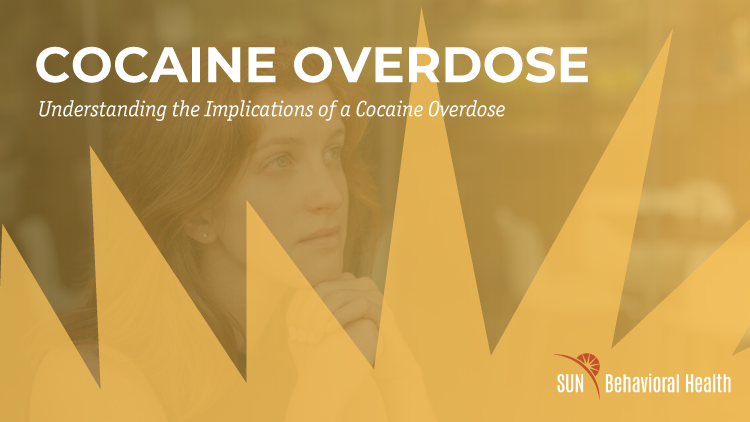Services
- Home
- Mental Health Services
- Who We Treat
- How We Treat
- Patients & Visitors
- About
close

It had been an ordinary night before your night shift job, or so you thought. You were snorting cocaine as you waited for a friend to pick you up for your shift like you had every night before for the last several years. It helped you stay awake and decrease your anxiety, which you’d been living with for years. However, this particular night, something seemed off. You felt intense chest pain and nausea. Your breathing had become rapid, and you were feeling lightheaded. You woke up the following day in the hospital to a kind-looking doctor informing you that you had experienced a cocaine overdose.
In 2018, 741 people died from a cocaine overdose in Texas. Sometimes, people might experience a cocaine overdose because they’re using cocaine to self-medicate a mental health condition, and it is then known as a co-occurring disorder. Having these disorders together can put you at an increased risk of a cocaine overdose. SUN Behavioral Health Houston proudly treats co-occurring disorders, allowing you a smoother recovery.
So, what happens when you experience a cocaine overdose?
An overdose occurs if someone takes too much cocaine or takes it with another substance. It can happen to anyone who takes the substance, not just people with a cocaine use disorder. However, those people may experience a higher risk of an overdose. When an overdose occurs, it is a medical emergency and requires medical professionals to help the person.
There are some early signs that someone might be experiencing a cocaine overdose, which can occur in three stages. The earliest stage of a cocaine overdose may involve someone experiencing a headache, nausea, and dilated pupils, while others experience vertigo and twitching. An increased blood pressure is also a common early sign of a cocaine overdose, or they may have rapid breathing. It is also possible that they will experience paranoia, confusion, aggression, or restlessness.
The second stage of a cocaine overdose may include seizures or incontinence. Some people may experience hypertension or an irregular heartbeat. Others may experience irregular breathing or begin to gasp.
The final stage of a cocaine overdose may include a coma or a loss of vital functions. They may also experience hypotension and cardiac arrest as well. Others may go into respiratory failure, and their skin, nails, or lips may begin to turn blue. People who are in a later stage of a cocaine overdose may also find themselves gasping for air.

There can be several other signs and symptoms that someone is experiencing a cocaine overdose. These might include:
Any overdose is a medical emergency as it can be life-threatening. People who are experiencing a cocaine overdose are often experiencing severe concerns with their heart and breathing, which may result in an increased risk of sudden death. They are also at an increased risk of experiencing a seizure, stroke, or heart attack. They may also experience damage to their kidneys or liver due to hyperthermia.
Most importantly, it is necessary to remain calm throughout the entire time that someone is experiencing an overdose. You will want to call 911 immediately so first responders can help your loved one. Naloxone will not reverse the effects of cocaine, but that doesn’t mean first responders won’t be able to help them. Remember to stay on the phone with the 911 operator until first responders arrive so you can report any changes your loved one has. They can walk you through any directions they have for you as things progress. Remember, the first responders are on their way.
When the first responders arrive, it is crucial to inform them of everything you know about the situation, such as symptoms and cocaine use. You will not get in trouble for being honest with the emergency workers. Texas’s Good Samaritan Law allows people to help in a medical emergency without getting in trouble. Providing this information to emergency workers can save your loved one’s life.
Cocaine is a stimulant, which means that it can cause different overdose signs than, say, a depressant. When someone takes more cocaine than their body can handle, it can result in severe consequences on vital organs, such as the heart and lungs. If someone has mixed cocaine with another substance, it can have even more severe side effects, as the impact of the two substances interacting can be unpredictable.
Anyone is at risk of experiencing a cocaine overdose. It can happen to anyone who consumes cocaine even once. However, if you have a cocaine use disorder, your chances of experiencing an overdose increase. There are also several other risk factors someone might have that could indicate they have a higher chance of experiencing an overdose due to their cocaine use.
One of the most common risk factors that will increase your chances of experiencing a cocaine overdose is your history with cocaine. If you are regularly using cocaine, each time you use it, it increases your risk that this time will result in an overdose. It increases your risk because cocaine is not regulated. Sometimes, this leads to people cutting cocaine with another substance to make it stronger or last longer. However, this practice is hazardous and can lead to a cocaine overdose.
Likewise, taking two or more substances together, even if they are not combined, is equally as dangerous as the combination is unpredictable and can result in adverse cocaine side effects. Also, people who regularly participate in cocaine binges may be more likely to experience an overdose due to the increase in the amount of the substance in their body.
Some other risk factors may increase one’s chances of experiencing a cocaine overdose. One of those factors includes psychiatric concerns such as depression or eating disorders. There have been some reports that feelings of hopelessness or a history of suicide attempts may result in a higher risk of an overdose.
Also, if you have overdosed on cocaine in the past, you may be more likely to overdose on cocaine in the future. In addition to this risk factor, people who have undergone a cocaine treatment program in the past and then return to using cocaine may have an increased chance of experiencing a cocaine overdose. Often, this occurs because people will return to the amount of cocaine they used before treatment, but their bodies are not as tolerant of that dosage anymore.

Experiencing and surviving a cocaine overdose does not mean you have failed. You are still able to find recovery from a cocaine use disorder. It may feel impossible and challenging, but there is an inner strength inside you. For years, it may have seemed as if cocaine has stolen that strength from you, but the reality is that it still exists. Perhaps you are asking yourself how you could find that inner strength when cocaine seems to have control of every aspect of your life.
By attending a cocaine addiction treatment program, you will receive the help you need to accomplish your goals. You do not have to find that inner strength alone. Treatment will provide you with the support and skills that are necessary to succeed in recovery.
Our SUN Behavioral Health Houston staff is solving unmet needs by empowering their community to step into a healthier, brighter future. Our Houston, TX location offers a women’s connections program specifically designed to help women along the healing journey. If you have any questions or concerns or are ready to take the first step toward your journey to recovering from a cocaine use disorder, please do not hesitate to call us at 713-796-2273 today.